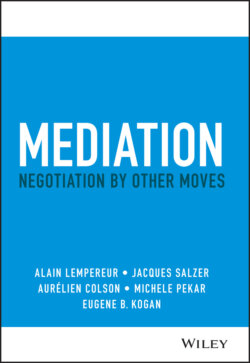Читать книгу Mediation - Alain Lempereur - Страница 62
Cost Control
ОглавлениеOn average, the predictable cost of mediation remains significantly less than that of a legal procedure. It is a frequently cited justification in favor of mediation. Litigating a case, especially if it involves an appeal, requires legal specialists, like bailiffs and lawyers, whose services prove expensive. Naturally, if mediation is engaged in parallel with a trial, the costs of one add to the costs of the other, especially if mediation does not result in an agreement; but if it succeeds, the trial is ended, sparing a much greater financial cost for the parties. In mediation, lawyers act as advisers and often charge more reasonable fees, because the time they save allows them to engage in other activities (Lempereur and Scodellaro 2003).
What about the mediator's compensation? In general, informal mediators are not paid. Institutional mediators are paid by their organization and not by the parties. What about ad hoc mediators? Many practices exist, responding to different contexts. Certain associations give unpaid services to their members, like the French Mediators' and Arbitrators' Association (AMAPA), which settles conflicts between audiovisual professionals. In this case, mediators voluntarily give their time. If not, as for all services, private advisory firms or liberal professions charge a flat fee, hourly fees, or an amount that depends on the total amount that is contested in the mediation. Certain complex affairs require a lot of time, not only for preparation but also in sessions; they require experienced and specialized mediators, whose services are valuable, and therefore expensive for parties. Even in this hypothesis, if two parties agree on the name of one mediator, rather than each one appointing a lawyer – thus two professionals – the incurred fees remain lower and are split between them.
It is up to each person to appreciate the value of the service rendered by paid or unpaid mediators (see Chapter 4). It would be dogmatic to consider that a mediation solution should necessarily be free. The more individuals, companies, and organizations are accustomed to work with lawyers whom they pay well and from whom they demand a lot, the higher‐quality services they will expect from mediators. Inevitably, a mediation market is put in place, and the law of supply and demand will apply. Reputable and experienced mediators will naturally be more costly. It is important to follow the evolution of the mediation costs, because the risk is that mediation will be viewed as an expensive process, like arbitration. Free mediations will persist in ad hoc mediation under the form of pro bono action and will continue to prevail in informal and institutional mediations.
